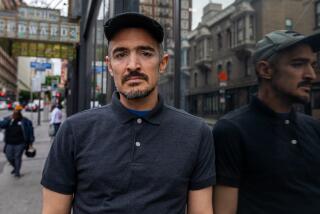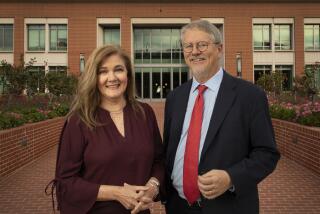United Way Report Cites Management, Funding Problems
The Los Angeles-area United Way, after years of tremendous growth, suffers from serious management problems that restrict its ability to raise more money so that it can meet changing community needs, according to an internal study provided to The Times.
United Way Inc.’s “present course . . . almost ignores public opinion, avoids a more visible presence in society, is mysterious and uncommunicative,” the study concluded. It also found that the organization’s relations with broad segments of the community are “eroding.”
The report confirms many of the complaints that have been leveled in recent years against the charity, which serves Los Angeles and western San Bernardino counties.
The $20,000 study was commissioned last fall by Francis X. McNamara Jr., the United Way president for 19 years, to examine management of the charity’s marketing and public affairs operations. He said Sunday that he has no plans to share it with the United Way board of directors or with the public.
However, the consultant, Lawrence F. Mihlon, said Sunday that he has mailed copies of the report to about 40 of the nearly 100 Los Angeles civic leaders and United Way professionals he interviewed at McNamara’s request. He also gave a copy to The Times.
Wields Enormous Power
Mihlon’s study states that McNamara, while a “genius” at community organizing who has built the nation’s largest United Way, wields such enormous power that he and the organization have become identical.
Major problems facing the local United Way, the study found, include an aging volunteer leadership nearing retirement, few minorities in positions of power and little interest by United Way in changing to meet their needs and interests. Other problems identified include increasing competition for corporate contributions, “continuing indifference” by the city’s large entertainment industries and a failure to develop donations at companies with 200 or fewer workers, where more than half of all jobs exist.
United Way’s chairman, Roy Anderson, 65, is the retired chairman of Lockheed Corp., and on June 17 he will be succeeded by William F. Kieschnick, 63, the retired president of Atlantic Richfield.
A recent United Way study estimated that 10% of Los Angeles County residents are Asians. But only one Asian serves on its 95-member board of directors, which is 81% white, 12% black and 6% Latino. Only white males have been United Way chairman or campaign chairman.
McNamara, 61, received the $20,000 study from the consultant in February. However, he gave a copy to Chairman Anderson and three directors only after The Times and KCBS television requested copies.
Mihlon, a former vice president for public affairs at two major corporations, said when McNamara hired him, he promised to share the findings with the United Way board.
‘Committed, Visionary’
Mihlon wrote that “there are informed observers across the nation who consider the volunteer leadership of LA’s United Way to be the most committed and visionary in North America. The job of recruiting these volunteers and working with them (some would say driving them) to achieve such impressive growth in funding and community service was co-opted essentially by one man, the corporation’s chief executive, Francis X. McNamara.
“There is little debate that United Way in Los Angeles and Frank McNamara have become one in the same,” Mihlon wrote.
The study recommends that the public and volunteers be regarded as “shareholders” who employ managers to carry out the policies they establish, saying this would give a broad spectrum of the community a sense of ownership in the organization.
McNamara, in an interview Sunday, said he believes that he has no more authority than any other United Way staff chief. He noted that the local United Way was the nation’s first to create leadership development programs for Latinos and Asians, and said a new one will be started for blacks.
“Involving volunteers is the key to success. We have united the community totally. We are identifying problems and solving them. Before I came there was no goal, it was just a conduit for money,” McNamara said.
This year, United Way Inc. collected $85.5 million in pledges to help 350 human-care charities.
Anderson, in an interview last week, spoke highly of McNamara’s dedication to community improvement. He also said Mihlon’s study convinced him that United Way needs a complete management study, and he has begun preliminary discussions to get one done free.
Report Follows Disclosure
“I want to make sure we have the right organization for the next five to 10 years when demands on the organization will be greater,” Anderson said.
Release of the 22-page Mihlon report follows disclosures by The Times and KCBS television that McNamara arranged more than $300,000 in loans of donated funds to five top United Way executives.
Most of the loans were interest-free and unsecured. McNamara did not seek approval for them from United Way’s board or the board’s executive committee, although he said he consulted with several directors. Chairman Anderson ordered two unsecured loans repaid immediately after learning of them from The Times and KCBS.
McNamara, Mihlon’s study found, holds United Way’s public relations staff in contempt, denying them basic information about the charity’s activities.
‘Mistreatment’ of Staff
On Sunday, Mihlon spoke highly of the nine-member public relations staff, saying, “It is amazing they do such a terrific job despite no strategic plan, that Frank has absolutely no idea what he wants from them and doesn’t communicate with them except after the fact, when he talks down to them.” He noted that McNamara’s “mistreatment” of the staff prompted the resignation last week of Brad Sales, United Way public relations director.
More to Read
Inside the business of entertainment
The Wide Shot brings you news, analysis and insights on everything from streaming wars to production — and what it all means for the future.
You may occasionally receive promotional content from the Los Angeles Times.










